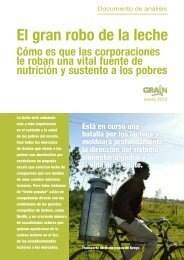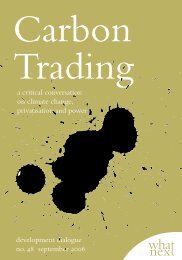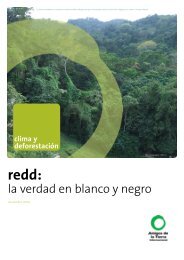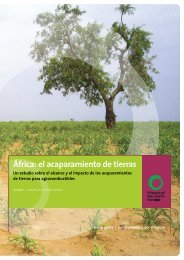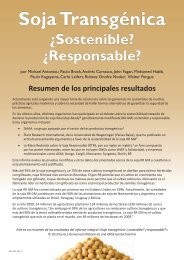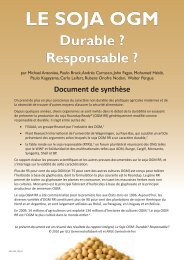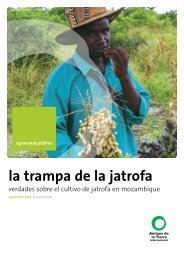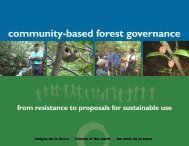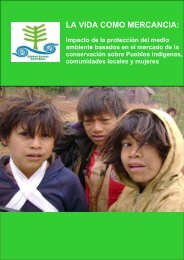Plantations, poverty and power - Critical Information Collective
Plantations, poverty and power - Critical Information Collective
Plantations, poverty and power - Critical Information Collective
You also want an ePaper? Increase the reach of your titles
YUMPU automatically turns print PDFs into web optimized ePapers that Google loves.
118<br />
Other parts of the guidelines are meaningless: “selecting indigenous species for the establishment of<br />
planted forests if they are equal to or better than introduced species for the purpose intended.” Decades of<br />
research into fast-growing eucalyptus species for pulp production ensures that this guideline can easily be<br />
met. There is a large global market in eucalyptus pulp. To plant industrial tree plantations with indigenous<br />
species for the pulp industry would require decades of research, the development of a new market <strong>and</strong><br />
millions of dollars of investment. No company is likely to undertake this research.<br />
Other parts of the guidelines clearly reveal FAO’s bias in favour of industrial tree plantations. Principle 4<br />
states that guidelines should include “deriving methods to better reflect the full value of planted forests in<br />
justifying investments by governments <strong>and</strong> private-sector investors (both corporate <strong>and</strong> small-holder)”.<br />
FAO seems to be suggesting developing new ways of justifying plantations. This is not a guideline for<br />
implementing plantations, it is an invitation for plantation proponents to produce propag<strong>and</strong>a in favour of<br />
plantations.<br />
In another example, the guidelines recognise “the role that planted forests can play in relieving harvesting<br />
pressures on naturally regenerating forests <strong>and</strong> in providing habitats for indigenous flora <strong>and</strong> fauna.” Both<br />
of these arguments are used frequently by the pulp <strong>and</strong> paper industry. The reality however is that<br />
industrial tree plantations often increase the pressure on forests <strong>and</strong> on other ecosystems such as<br />
grassl<strong>and</strong>s.605 Industrial tree plantations have no impact whatsoever on reducing the underlying causes<br />
of deforestation such as the expansion of cash crops like soya, sugar or oil palm. Neither do industrial tree<br />
plantations have any impact on reducing road construction through native forests or the construction of<br />
massive hydro<strong>power</strong> dams which flood forests <strong>and</strong> result in the eviction of people from their l<strong>and</strong> <strong>and</strong><br />
homes.<br />
While indigenous flora may sometimes be found within industrial tree plantations, it is more common<br />
(particularly in South Africa) that plantations provide habitat for alien invasive weed species. In any case,<br />
plantation managers do not encourage the growth of any species other than the trees which provide raw<br />
material to industry. Indigenous fauna can also be found in industrial tree plantations, but fewer species<br />
than in native ecosystems.<br />
In yet another example of bias in favour of industry, the guidelines state that:<br />
“Where stakeholders are communities, they may not always be in a position to communicate confidently<br />
with government or the corporate private sector due to their limited capacity <strong>and</strong> capability. In these<br />
instances, reputable non-governmental, community-based or other organizations are encouraged to work<br />
with them to strengthen their capacity <strong>and</strong> capability.”606<br />
Nowhere do the guidelines mention the limited capacity <strong>and</strong> capability of governments <strong>and</strong> corporations<br />
to listen to what communities are saying. No mention is made of strengthening corporations’ capacity <strong>and</strong><br />
capability in this regard. Instead, FAO recommends that NGOs should work with communities to teach<br />
them how to communicate.<br />
605 See Ricardo Carrere (1999) “Ten Replies to Ten Lies”, World Rainforest Movement, August 1999.<br />
http://www.wrm.org.uy/plantations/material/lies.html<br />
606 FAO (2006) “Responsible management of planted forests: voluntary guidelines”, Planted Forests <strong>and</strong> Trees Working<br />
Paper 37/E, UN Food <strong>and</strong> Agriculture Organisation, page 25. http://www.fao.org/docrep/009/j9256e/J9256E00.htm



